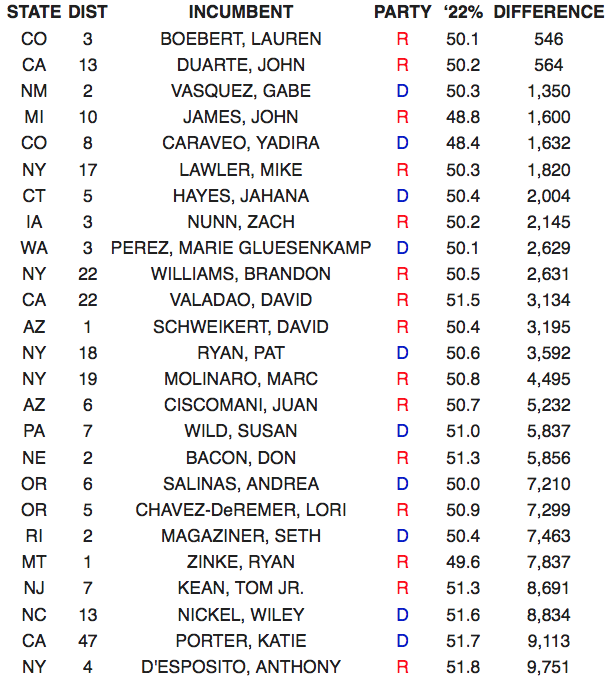By Jim Ellis — Thursday, June 6, 2024
Incumbents
We have now seen primary elections held in 22 states, meaning electorates in a majority of 242 US House districts have chosen their general election nominees, and we have yet to see one incumbent lose renomination to a challenger. Alabama Rep. Jerry Carl (R-Mobile) did lose to Rep. Barry Moore (R-Enterprise), but that was due to an incumbent pairing from a court-ordered redistricting directive.Earlier in the week, New Jersey US Rep. Rob Menendez (D-Jersey City) defeated his Democratic challenger, Hoboken Mayor Ravi Bhalla, by a 54-36 percent margin in a race that polling and fundraising suggested would be close. To date, it appeared that Rep. Menendez was the most vulnerable House incumbent standing for renomination, but in the end he easily repelled the strong challenge.
Menendez, a freshman member of the New Jersey delegation, saw his favorability numbers tumble as a result of his father, Sen. Bob Menendez (D-NJ), and step-mother being indicted for bribery.
With Menendez and Iowa Reps. Mariannette Miller-Meeks (R-LeClair) and Randy Feenstra (R-Hull/Sioux City) winning their primaries on Tuesday, we’ve now seen the incumbents going nine for nine in non-jungle partisan primaries when facing a reasonably credible intra-party opponent. At least another 16 challenges are on tap in the remaining primaries.
The strong incumbent performances suggest we may be seeing early signs that the 2024 election cycle will be similar to 2022. In an election year when polling suggested that the public overwhelmingly believed, and still does, that the country is on the wrong track, and moving in the wrong direction, the voting public then turned around and re-elected virtually every incumbent on the ballot.
Two years ago, 56 senators and governors from both parties ran for re-election; 55 won. In the House, the incumbent retention rate for those seeking re-election was 98.1 percent. These are unusual statistics for an electorate demanding a change in public policy. Though we see the same unrest regarding government policies today, the early voting pattern suggests that, so far, we again see the juxtaposition of incumbents having a strong year even though the electorate is generally displeased.
The trend may soon change, however. Two of the most vulnerable incumbents facing primary challenges are on the ballot this month. Reps. Bob Good (R-VA) and Jamaal Bowman (D-NY) look to be in serious trouble as their respective primaries loom on the near horizon — June 18 for Good and a week later in Bowman’s case.
Rep. Good’s opponent is state senator and retired Navy SEAL John McGuire, who brandishes an endorsement from former President Donald Trump. Since Good was one of the key Republican House members behind the ouster of then-Speaker Kevin McCarthy, another source of opposition is present. Thus, Rep. Good not only faces a Trump endorsement going against him, which has more often than not been golden in a Republican primary, but McCarthy is assisting in directing outside money to help ensure the congressman’s defeat.
Furthermore, competing in a primary is something new for Rep. Good. Previously, he won his nominations through a district party convention before a small number of delegates who favored him. Therefore, facing a credible opponent with backing from national party leaders in an unfamiliar election structure could well be enough to deny Congressman Good renomination.
Rep. Bowman is facing an even more difficult opponent than Good. George Latimer is the Westchester County Executive who represents 91 percent of Bowman’s 16th Congressional District’s constituency in his current position. Before being elected County Executive, Latimer served in the state Senate and Assembly. Latimer has also raised about $1 million more than Rep. Bowman, and even has the endorsement of one of the congressman’s fellow “Squad” members.
Former Rep. Mondaire Jones (D), who represented the adjoining Westchester County congressional district for a term, was a “Squad” member, and is trying to come back in this election. Earlier this week, Jones endorsed Latimer, a former employer, and publicly dispelled Bowman’s comments that Latimer is a racist.
Only two polls of this race have been released, and those were back in March. One showed the two men virtually tied, while the other yielded Latimer a 17-point lead. Yet, Bowman has not produced any countervailing data in the succeeding weeks.
Ironically, both Good and Bowman came to office by deposing an incumbent from their own party. Good, via the district convention, unseated freshman Rep. Denver Riggleman in 2020, while Bowman defeated veteran Congressman Eliot Engel in the Democratic primary of the same year. Now, both men could see the tables turn on themselves very soon.








